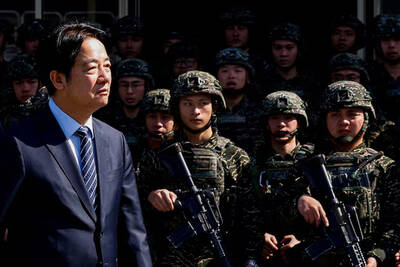Passage of a regulation to allow for changes in election dates or poll station locations in the case of natural disasters or other "unavoidable causes" was postponed yesterday as Central Election Commission (CEC) members debated the wording.
"Although all [commission] members considered the regulation necessary and urgent ... we felt that we needed to create a special team" to examine the regulation first, CEC Secretary-General Teng Tien-yu (
The CEC has delegated the task to a five-member team, he said.
"We're trying to pass the regulation in accordance with a new amendment to the Election and Recall Law of Civil Servants [
The amendment, passed by the legislature last month, stipulates that local election commissions can change election dates with the CEC's approval if "an election cannot proceed because of a natural disaster or other unavoidable cause."
A clause under the article requires the commission to draw up a regulation to stipulate how an election postponement should be handled.
In the draft regulation, "natural disaster" has been defined as a severe typhoon, earthquake or flood that could prevent voters from traveling to poll stations or damage poll stations.
However, commission members disagreed over the meaning of the words "unavoidable cause."
CEC members recommended by the pan-blue camp said the regulation was too ambiguous.
"We need to define clearly what `unavoidable' means" said Liu Kuang-hua (
Chao Shu-chien (
Teng, on the other hand, said the phrase was legal terminology that "also appears in the Election and Recall Law [of Civil Servants]."
Liu, however, said: "What was not an issue in the past won't necessarily not become an issue."
Although no timetable has been set for passage of the regulation, the CEC will pass it "as soon as possible so that it will be in place before the legislative elections," Teng said.
Earlier yesterday, Legislative Speaker Wang Jin-pyng (
"It's necessary to prepare for possible situations on election day, but it would be very inappropriate if such preparations were done with specific motives," Wang told reporters at the Legislative Yuan.
KMT Chairman Wu Poh-hsiung (
KMT caucus whip Kuo Su-chun (
"The CEC has never discussed this kind of draft [regulation] before. It will use the draft to reverse election results if they are bad for the DPP," Kuo said.

The Taipei Mass Rapid Transit (MRT) Wanda-Zhonghe Line is 81.7 percent complete, with public opening targeted for the end of 2027, New Taipei City Mayor Hou You-yi (侯友宜) said today. Surrounding roads are to be open to the public by the end of next year, Hou said during an inspection of construction progress. The 9.5km line, featuring nine underground stations and one depot, is expected to connect Chiang Kai-shek Memorial Hall Station to Chukuang Station in New Taipei City’s Jhonghe District (中和). All 18 tunnels for the line are complete, while the main structures of the stations and depot are mostly finished, he

Taipei is to implement widespread road closures around Taipei 101 on Friday to make way for large crowds during the Double Ten National Day celebration, the Taipei Department of Transportation said. A four-minute fireworks display is to be launched from the skyscraper, along with a performance by 500 drones flying in formation above the nearby Nanshan A21 site, starting at 10pm. Vehicle restrictions would occur in phases, they said. From 5pm to 9pm, inner lanes of Songshou Road between Taipei City Hall and Taipei 101 are to be closed, with only the outer lanes remaining open. Between 9pm and 9:40pm, the section is

The Taipei Economic and Cultural Office in Vancouver, Canada, on Saturday hosted a reception to celebrate Double Ten National Day. Conservative Canadian lawmaker Marc Dalton called Taiwan a “beacon of courage and resilience in the face of rising authoritarianism,” according to a post on the Taiwan in Vancouver Facebook page. Also in attendance were fellow conservative caucus members Tako Van Popta and Chak Au, who said that Taiwan plays an “indispensable role” in ensuring global peace, prosperity and stability due to its strategic position in the Indo-Pacific region, it said. Canadian lawmaker Michael Cooper also recorded a message wishing Taiwan a

President William Lai (賴清德) is expected to announce a new advanced “all-domain” air defense system to better defend against China when he gives his keynote national day speech today, four sources familiar with the matter said. Taiwan is ramping up defense spending and modernizing its armed forces, but faces a China that has a far larger military and is adding its own advanced new weapons such as stealth fighter jets, aircraft carriers and a huge array of missiles. Lai is expected to announce the air defense system dubbed “Taiwan Dome” in his speech this morning, one of the sources said. The system